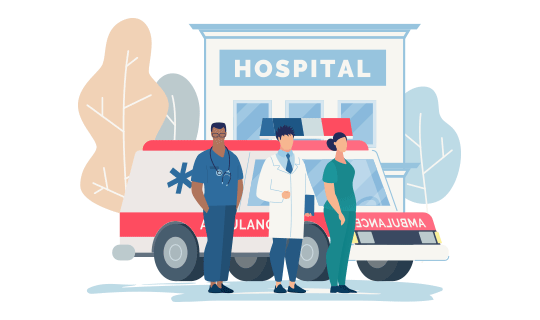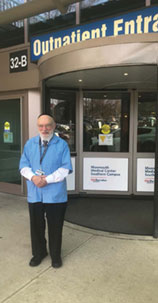
Don't hesitate to get prompt care when you experience key signs of trouble.
People often put off going to the Emergency Department (ED) when they shouldn’t wait. “They think their health issue will turn out to be nothing serious,” says Sreedar Raja, MD, Chair of the ED at Monmouth Medical Center Southern Campus (MMCSC). “But with many emergencies, including heart attack or stroke, time is very important. Waiting too long after symptoms start can limit our ability to give effective treatment.”

Are your symptoms nothing to worry about—or do you need a trip to the ED? Signs that deserve to be checked right away include these common areas of concern:
Chest Pain, especially if the pain is a type you haven’t had before, makes you anxious or is associated with shortness of breath or sweating. “We’re here to make an evaluation,” Dr. Raja says. “Come in so we can do appropriate tests.”
Breathing Problems. Any time you have serious breathing problems, especially if you have a chronic respiratory issue such as asthma or COPD, call 911. Emergency responders can help stabilize you with medication and oxygen even before you get to the ED.
High Fever. Elevated body temperature, especially if it’s accompanied by shaking and chills, could be a sign of infection that has moved to the bloodstream. “We treat this very aggressively,” Dr. Raja says. For children especially, go to the ED if fever is accompanied by severe headache, lethargy or other unusual behavior.
Abdominal Pain, especially if it’s accompanied by fever, is localized in one area of the abdomen or is accompanied by severe vomiting or diarrhea. “Gastrointestinal concerns such as appendicitis and bowel obstruction are emergencies that may require surgery,” Dr. Raja says.
A Head Thing, especially if you were stunned or lost consciousness; are taking blood thinners; are elderly; or have symptoms such as weakness, numbness or vision problems.
Stroke or Neurological Symptoms. If new and different neurological symptoms occur, such as weakness or numbness in any part of your body or a change in speech or vision, call 911 and get to the ED as quickly as you can.
Behavioral Crisis. If you’re having thoughts of harming yourself or others, or are suffering from a narcotic or alcohol overdose, call 911. “We can give reversal agents for certain narcotic or other drug overdoses, monitor vital signs, administer fluid and connect people with counselors and recovery rehab services,” Dr. Raja says.
Don’t be embarrassed if a worrisome symptom turns out to be nothing. “We’re here to assess these issues,” Dr. Raja says. “We’re happy if chest pain turns out to be acid reflux and not a heart attack. But getting checked out ensures we don’t miss serious cases.”
There For Patients — And Been There Himself
 When hospital volunteer Mordechai Goodman of Lakewood greets patients at Monmouth Medical Center Southern Campus (MMCSC), he knows what they’re going through: He’s been an MMCSC patient himself. “I’ve had great experiences all three times I had to visit,” he says.
When hospital volunteer Mordechai Goodman of Lakewood greets patients at Monmouth Medical Center Southern Campus (MMCSC), he knows what they’re going through: He’s been an MMCSC patient himself. “I’ve had great experiences all three times I had to visit,” he says.
His most recent and serious stay began when returning from a vacation trip in January 2021. “On the drive home, I began coughing that persisted and got worse,” Goodman says. His wife called Hatzolah of Central Jersey EMS, and responders took him to MMCSC’s Emergency Department for further tests.
“I couldn’t believe how quickly I was tested and diagnosed,” Goodman says. What he thought might be pneumonia turned out to be a blood clot, and he was admitted for treatment from what he felt was a great, caring team.
A hospital volunteer since 2018, Goodman also has joined MMCSC’s Patient and Family Advisory Council, a group of volunteers who help shape hospital services and cultivate partnerships with patients and families.
“Mordechai not only is warm and welcoming to our outpatient visitors, but also is a studious advocate for them,” says Donna Salin, Director of Patient Experience and Volunteer Services. “He’s a true pleasure to work with.”
Honored For Nursing Leadership
Jennifer Lees, RN, MSN, NE-BC, Director of Emergency Services at Monmouth Medical Center Southern Campus (MMCSC), was honored with the Clinical Nurse Leadership Award from the New Jersey Emergency Nurses Association (NJENA) in recognition of excellence in the profession of emergency nursing and significant contributions through an emergency nursing leadership role.
Lees leads a team of more than 70 staffers delivering adult and pediatric emergency medical care, and manages the Psychiatric Emergency Screening Services unit. In nominating Lees, peers noted she “shows constant dedication; commitment to serve and engage; vigor to assist; mentorship; and leadership every single day, no matter what the obstacles.”
“Jen leads by example and exemplifies our organization’s mission and vision to serve our community with compassion and excellence,” says Eric Carney, President and CEO, MMCSC and Monmouth Medical Center. “Even through the COVID-19 pandemic, Jen’s expertise and team leadership contributed to the highest Press Ganey patient satisfaction scores in the region for Emergency Services. She also leads an onboarding program for newly hired staff and continually promotes employee engagement. It is evident how her colleagues value her skills and her collaboration with other departments within the hospital.”
To learn more about the Emergency Department at Monmouth Medical Center Southern Campus, call 732-886-4525. In an emergency, dial 911.